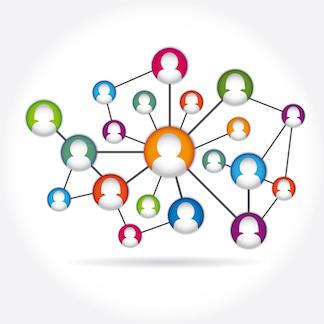Networking… brings new opportunities and knowledge
You never know who you might meet through networking, what experiences they can share with you or what opportunities might arise. Or who might be a part of their network that could soon become a part of yours. Networking helps you to expand your horizons and get your name and face out there.
In turn, the more people you meet, the more knowledge you’ll gain about the particular industry that you’re interested in. The more knowledge you can show, the better an impression you can make and the more targeted your networking can become. It’s a positive cycle that can only help your chances of finding the opportunity or break you’ve been looking for.
Networking… can build confidence and communication skills
Walking up to a stranger and starting a conversation isn’t easy, even for the most confident of people. But the more you do it, the more you’ll learn about the best way to approach people, how to break the ice and what makes a good conversation topic. So be brave and put yourself out there – you could get more out of the interaction than just a potential lead on a job!
Networking… is about developing relationships
It can be easy to think of networking simply as an opportunity to promote yourself and what you can offer. But it’s really about establishing relationships with those around you – relationships that could lead to opportunities in the future. So make sure that you resist the urge to just talk about yourself! Learn about the people you meet and their companies. Ask as many questions as you answer. And start developing those all-important relationships.
Networking… can be both online and offline
Traditionally, networking meant attending an event or a social gathering. But thanks to sites like LinkedIn, online networking has grown in popularity and reach. The benefits of online networking lie in the ability to connect with people all over the world at the click of a button. The drawbacks include a lack of the face-to-face interaction that can sometimes be essential when it comes to making a good impression or positioning yourself as a potential employee. Why not try combining the two approaches to make sure that you’re getting as much exposure as possible?
Networking… is long-term
Business cards are a useful networking tool, but it can be all too easy to collect them with the best of intentions, put them in your bag and never look at them again. The truth is, when someone hands you a business card, you’re just at the start of the journey. Following up with the contacts you’ve made is almost as important as making them in the first place. Send an email, make a phone call – it doesn’t matter. Keeping the conversation going could mean that your name is the one that pops into their mind when a new opportunity arises.
Networking… takes time and commitment
Unless you’re extremely lucky, attending a single event or joining a single community isn’t going to result in a job. Networking takes patience and strong commitment in order to be effective. While it might sometimes seem like your time would be better spent elsewhere, networking is worth the investment thanks to the benefits, both personal and professional, that it can bring in the long-run.
Want to get networking, but not sure where to start? Why not check out European Job Days, online and onsite recruitment fairs that bring together jobseekers and businesses from across Europe? Or if you’ve already networked your way into a job interview, then be sure to check out 5 tips for acing your interview.
Related links:
Read more:
Working and living conditions in EURES countries
EURES Jobs Database
EURES services for employers
EURES Events Calendar
Upcoming Online Events
EURES on Facebook
EURES on Twitter
EURES on LinkedIn
EURES on Google+
Details
- Publication date
- 29 May 2017
- Authors
- European Labour Authority | Directorate-General for Employment, Social Affairs and Inclusion
- Topics
- EURES best practice
- Hints and tips
- Recruiting trends
- Youth
- Related section(s)
- Sector
- Accomodation and food service activities
- Activities of extraterritorial organisations and bodies
- Activities of households as employers, undifferentiated goods- and services
- Administrative and support service activities
- Agriculture, forestry and fishing
- Arts, entertainment and recreation
- Construction
- Education
- Electricity, gas, steam and air conditioning supply
- Financial and insurance activities
- Human health and social work activities
- Information and communication
- Manufacturing
- Mining and quarrying
- Other service activities
- Professional, scientific and technical activities
- Public administration and defence; compulsory social security
- Real estate activities
- Transportation and storage
- Water supply, sewerage, waste management and remediation activities
- Wholesale and retail trade; repair of motor vehicles and motorcycles
